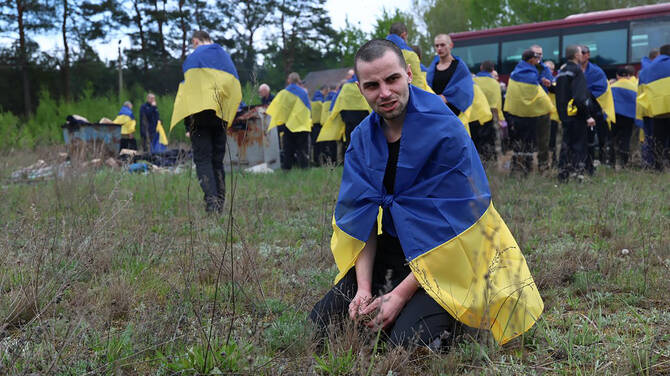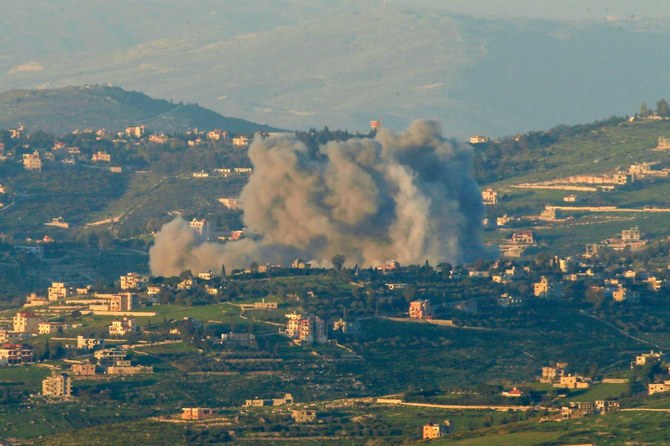BEIRUT: A Lebanese couple and their son were killed Tuesday in an Israeli strike on a house in the southern border village of Hula, Lebanon’s official National News Agency reported.
Lebanon’s Iran-backed Hezbollah movement and Israel have traded deadly cross-border fire on a near-daily basis since war broke out in October between Israel and Gaza’s rulers Hamas, a Hezbollah ally.
“The three civilians, Hassan Hussein, his wife, Ruwaida Mustafa, and their 25-year-old son, Ali Hussein, were killed in the enemy raid on a three-story house in Hula,” NNA said.
“Search operations and the removal of rubble are continuing,” it added.
Shortly before the strike, Hezbollah said it had targeted the Israeli city of Kiryat Shmona in response to Israeli attacks on “civilian homes,” particularly Bint Jbeil.
The Lebanese Shiite movement also said it carried out several attacks on Israeli military positions on the border on Tuesday.
NNA had reported on Monday evening that Israeli air raids targeted Bint Jbeil, but no casualties were reported.
Also on Monday, a missile fired from Lebanon killed a foreign worker in Israel, according to the army, and three Hezbollah-affiliated paramedics were killed in an Israeli raid on southern Lebanon, according to Hezbollah.
It came as US envoy Amos Hochstein said a diplomatic solution was key to ending nearly five months of intensifying hostilities between Hezbollah and Israel.
“A diplomatic solution is the only way to end the current hostilities” and achieve “a lasting fair security arrangement between Lebanon and Israel,” he said, adding “a temporary ceasefire is not enough.”
Israeli Defense Minister Yoav Gallant has said there will be no let-up in Israeli action against Hezbollah even if a Gaza ceasefire is secured.
The fighting has killed at least 302 people in Lebanon, most of them Hezbollah fighters but also including at least 51 civilians, according to an AFP tally.
In Israel, at least 10 soldiers and seven civilians have been killed.
Three civilians killed in Israel strike on Lebanon
https://arab.news/rhn29
Three civilians killed in Israel strike on Lebanon

- Shortly before the strike, Hezbollah said it had targeted the Israeli city of Kiryat Shmona in response to Israeli attacks on ‘civilian homes’
- Israeli Defense Minister Yoav Gallant has said there will be no let-up in Israeli action against Hezbollah even if a Gaza ceasefire is secured
UAE mediates deal for release of further 410 Russian and Ukrainian prisoners of war

- It is the 15th in a series of UAE-mediated prisoner-swap agreements that have resulted in the release of 4,181 captives in total
LONDON: The UAE has mediated the 15th in a series of agreements between Russia and Ukraine for the release of prisoners of war, as part of its ongoing diplomatic efforts to help resolve the conflict.
Under the latest prisoner-swap deal, 205 Ukrainians and 205 Russians were freed on Tuesday, the Emirates News Agency reported. The Emirati Ministry of Foreign Affairs said a total of 4,181 Russian and Ukrainian captives have now been released as a result of its mediation efforts, the continuing success of which reflects the level of trust Kyiv and Moscow have in the UAE.
The UAE remains determined to find a peaceful resolution to the war in Ukraine, which began in February 2022, and to help ease the humanitarian suffering it has caused, the ministry added.
Lebanon says one killed in Israeli strike on south

- The ministry said in a statement that the “Israeli enemy” strike on Kfar Rumman killed one person and wounded three others
- Israel has continued to launch regular strikes in Lebanon despite the November 27 truce
BEIRUT: Lebanon’s health ministry said an Israeli strike Tuesday on a car in the country’s south killed one person, the latest attack despite a fragile ceasefire between Hezbollah militants and Israel.
The ministry said in a statement that the “Israeli enemy” strike on Kfar Rumman killed one person and wounded three others.
Lebanon’s state-run National News Agency said the car was hit with a “guided missile” on the road linking the town of Kfar Rumman with the nearby city of Nabatieh.
There was no immediate comment from the Israeli military.
Israel has continued to launch regular strikes in Lebanon despite the November 27 truce which sought to halt more than a year of hostilities with Hezbollah including two months of all-out war, with a heavy Israeli bombing campaign and ground incursion.
Under the deal, Hezbollah was to pull its fighters north of Lebanon’s Litani River, some 30 kilometers (20 miles) from the Israeli border, and dismantle any remaining military infrastructure to its south.
Israel was to withdraw all its forces from south Lebanon, but it has kept troops in five positions that it deems “strategic.”
A Lebanese security source told AFP that Hezbollah had withdrawn fighters from south of the Litani and dismantled most of its military infrastructure in that area.
Lebanon says it has respected its commitments and has called on the international community to pressure Israel to end its attacks and withdraw from the five border positions.
Huge dust storm sweeps into Iran, affecting millions

- State television urged people to remain inside and wear face masks if they had to go out
TEHRAN: Iranian authorities ordered schools and offices closed in seven western provinces Tuesday as a dust storm swept in from neighboring Iraq, with around 13 million people told to stay indoors.
Khuzestan, Kermanshah, Ilam and Kurdistan provinces were all affected, and state television cited local officials as blaming the closures on high levels of accumulated dust.
Government and private offices also shut in several provinces including Kermanshah and Ilam, as well as Khuzestan in the southwest.
Zanjan in the northeast and Bushehr in the south were also hit.
Bushehr, nearly 1,100 km south of Tehran, was given an Air Quality Index of 108 on Tuesday, rated “poor for sensitive groups.”
That figure is more than four times higher than the concentration of air microparticles deemed acceptable by the World Health Organization.
Iran’s meteorological authorities said the conditions were caused by “the movement of a large mass of dust from Iraq toward western Iran.”
State television reported low visibility in some areas and urged people to remain inside and wear face masks if they had to go out.
Last month, a similar dust storm in Iraq grounded flights and sent thousands of people to hospital with breathing problems.
On Monday, Iran’s IRNA state news agency said more than 240 people in Khuzestan province had been treated for respiratory issues because of the dust.
A spokesperson for the emergency services also told Tasnim news agency on Tuesday that nine people had died as a result of storms in Iran over the past seven days, ending on Monday.
“Four of the deaths were caused by strong winds and falling objects, and five were caused by lightning strikes,” it added.
Tunisia puts more opposition figures on mass trial

- The 'conspiracy against state security II' involved 22 defendants, including 83-year-old Ennahdha party leader Rached Ghannouch
- The majority of the defendants are being tried in absentia, having fled the country
TUNIS: A new trial of nearly two dozen Tunisian opposition figures accused of plotting against the state opened on Tuesday, weeks after a separate mass trial jailed nearly 40 defendants on similar charges.
The latest trial — known as the “conspiracy against state security II” — involved 22 defendants, including 83-year-old Islamist-inspired Ennahdha party leader Rached Ghannouchi, currently jailed in another case.
Youssef Chahed, a former prime minister, and Nadia Akacha, once the head of the presidential office, were also among the defendants, according to court documents.
The defendants were accused of terror-related charges, incitement to murder, and “plotting against state internal security,” among other charges, according to a court document.
The majority of the defendants are being tried in absentia, having fled the country, lawyer Samir Dilou said.
Ghannouchi was already sentenced in early February to 22 years in prison — also for plotting against state security in a different case.
He had been the speaker of parliament when President Kais Saied staged a sweeping power grab in 2021.
In this case, Ghannouchi as well as other Ennahdha officials stand accused of setting up a “secret security apparatus” in service of the party, which had dominated Tunisia’s post-revolution politics.
Tunisia had emerged as the Arab world’s only democracy following the ouster of longtime ruler Zine El Abidine Ben Ali in 2011, after it kicked off the Arab Spring uprisings.
Tuesday’s hearing was conducted remotely with only four defendants attending virtually, according to lawyers.
Last month’s similar trial had drawn criticism from the United Nations, which said it was “marred by violations of fair trial and due process rights.”
But Saied dismissed the “comments and statements by foreign parties” as “blatant interference in Tunisia’s internal affairs.”
In a statement on Monday, Tunisia’s main opposition coalition, the National Salvation Front (FSN), called for “an end to sham and unfair trials,” demanding “the release of all political prisoners.”
Oman announces US-Houthi ceasefire deal

- “They said please don’t bomb us any more and we’re not going to attack your ships,” Trump said
- There was no immediate response from the Houthis
WASHINGTON: The United States and Yemen’s Houthis have reached a ceasefire agreement, mediator Oman announced Tuesday, saying the deal would ensure “freedom of navigation” in the Red Sea where the militia has attacked shipping.
“Following recent discussions and contacts... with the aim of de-escalation, efforts have resulted in a ceasefire agreement between the two sides,” said Omani Foreign Minister Badr Albusaidi in a statement posted online, adding that “neither side will target the other... ensuring freedom of navigation and the smooth flow of international commercial shipping” in the Red Sea.
Earlier on Tuesday, President Donald Trump said that the US will stop bombing the Houthis in Yemen after the Iran-aligned group agreed to stop interrupting important shipping lanes in the Middle East.
In an Oval Office meeting with Canadian Prime Minister Mark Carney, Trump announced the Houthis have said that they no longer want to fight but did not elaborate on the message.
“They said please don’t bomb us any more and we’re not going to attack your ships,” Trump said.
The Houthis have been firing at Israel and at shipping in the Red Sea since Israel began its military offensive against Hamas in Gaza after the Palestinian militant group’s deadly attack on Israel on October 7, 2023.
The US president said Washington will take the Houthis’ word that they would not be blowing up ships any longer.
Tensions have been high since the Gaza war began, but have risen further since a Houthi missile landed near Israel’s Ben Gurion Airport on Sunday, prompting Israeli airstrikes on Yemen’s Hodeidah port on Monday.
The Israeli military carried out an airstrike on Yemen’s main airport in Sanaa on Tuesday, its second attack in two days on the Houthis after a surge in tensions between the group and Israel.





















